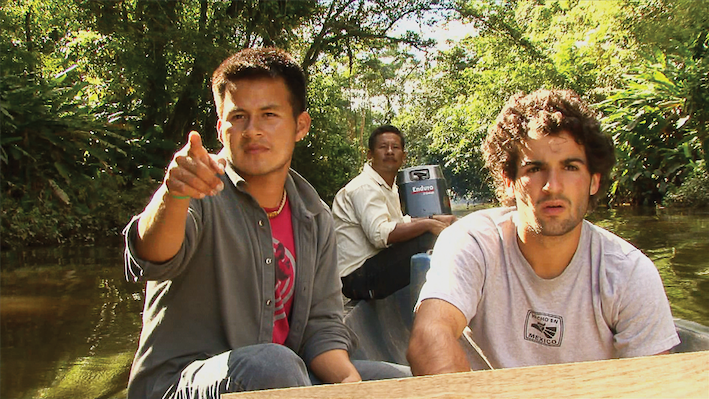Hugo Lucitante dips his hand into the pond. It comes out covered in hot, black crude. He is a stone’s throw away from the Aquarico River that his people, the Cofán, rely on for everything.
The Cofán lived in the Amazon rainforest long before companies like Texaco came to drill. They are trying to maintain their culture, but the government has given away the land under their feet to encourage colonization of the “empty” territory. And of course, when oil comes out of the ground, it comes out with health, environmental and social problems.
On the other side of the title sequence there is a parallel of Hugo’s opening scene: David Poritz is also peering into the water – a village well. “Chromium,” he declares to a group of voluntourist types. “Cancer water.”
Oil and Water is the chiasmus of two lives defined by this issue.
Oil and Water is the chiasmus of two lives defined by this issue. Until the age of ten, Hugo Lucitante lived in the village of Zábalo on the Aquarico River. Then an American graduate student visited and Hugo’s father asked her to take his son to America so that he might “understand who the enemy is.” If this sounds desperate, well, what would you have suggested to a disenfranchised people on the brink of losing their way of life?
David, on the other hand, is driven by his own choices and ambitions. A school project on oil spills led to volunteering for a class action suit against Texaco, which led to visiting the villages along the Aquarico River, which led to a realization. There was no EPA for the developing world; there was no real recourse for the victims. His solution is a fair-trade-style certification for oil companies called Equitable Origin. He hopes consumer pressure and government regulations will force companies to behave responsibly in order to earn his certification.
David, Hugo and the Cofán provide Oil and Water with a lot of fascinating subject matter and it does a great job of taking us into these lives. The footage is often immersive. The acoustic guitar-driven soundtrack does an excellent job of conveying urgency and melancholy.
My only complaint is that the movie never goes very deep. It brings up good questions but we often get no answer, or only superficial ones.
For example, what must it be like to be Hugo, to have been chosen to save his people when he was just a boy? Hugo mostly just shrugs. He hopes vaguely that if he gets a college degree he’ll know what to do. We’d despair that Hugo is unable to help his people, except that buried in the middle of the film, mentioned almost in passing, we learn that he helped with two intriguing projects: creating a map of the Cofán’s traditional territory using oral histories to assert land rights, and leading grassroots restoration of polluted areas. But instead of exploring that, we get a lengthy montage of Hugo’s family seeing America for the first time, complete with waving on the Jumbotron at a baseball game and piling into the SUV for a trip to McDonald’s.
In David’s case, I want to know how he has gone from describing the development of oil in Ecuador as “an indirect genocide” to inspecting an extraction site and nodding sympathetically as the PetroEcuador manager says “there’s always going to be some impact.” After defending Equitable Origin in an interview with a journalist, he seems genuinely uncomfortable with his evolution from idealist to pragmatist. Then we get a clip where he jubilantly unboxes some Equitable Origin golf balls for promoting his certification and that’s about it. Are oil companies signing up? Are Indigenous peoples happy with the standards? Are they leading to positive change?
Maybe that’s just how life is. No easy answers, no tidy story arcs, lots of loose ends. Maybe the filmmakers ran out of time to explore the issues more deeply and had to just ship the DVD. Either way, the movie tells a good story and if it makes you, like me, curious about what happened next with David and Hugo, then it has done its job.
Oil and Water directed by Francine Strickwerda & Laurel Spellman-Smith, USA/Ecuador: Stir It Up Productions, 2014, 77 minutes.
Book a screening of Oil and Water through BullfrogCommunities.com. Bullfrog handles the Canadian rights for most of the offerings on their site and definitely for this film.
Reviewer Information
Ben is a former A\J editorial intern. He’s currently a freelance writer based in Ottawa. He tells stories about nature, science and policy.
Ben is a former A\J editorial intern. He’s currently a freelance writer based in Ottawa. He tells stories about nature, science and policy.













